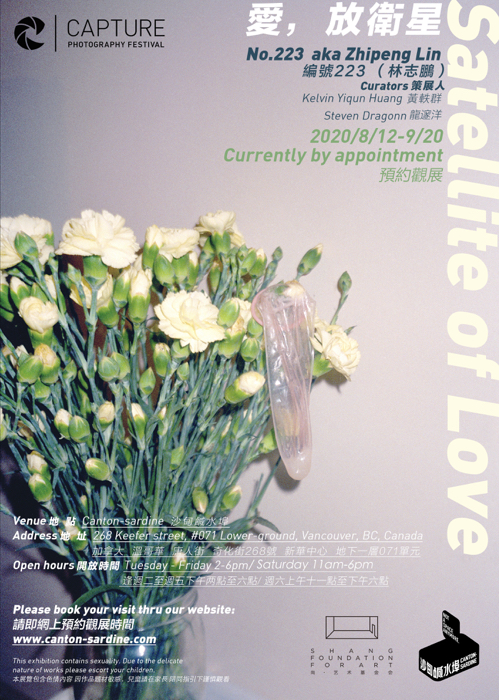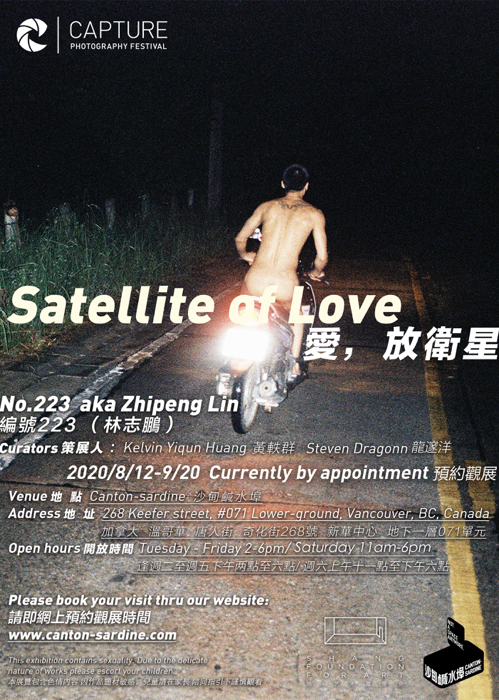愛,放衛星 | 編號223
策展人:黃軼群、 龍邃洋
展覽時間:2020年8月12日至9月20日
地點:沙甸鹹水埠,溫哥華
“衛星走了,飛奔天際,似乎也帶走我的思緒,這就是看電視的樂趣,就在我看著它的那瞬間……衛星走了,奔向火星,那裡很快將停滿汽車,我愛死看電視了,而就在我看著它的那瞬間,卻被告知妳和哈利、馬克、約翰鬼混去了。從週一到週四,竟和哈利、馬克、約翰在一起……”摘自盧·里德《愛之衛星》歌詞。
《愛之衛星》是一首由盧·里德於1970年當他還在地下絲絨樂隊作為主唱時作的搖滾歌曲。這首歌描述了一個男人看著火箭升空的電視畫面時對他不忠的女朋友莫名其妙地難受的妒忌。這是傑克·凱魯亞克筆下始於1950年代紐約的“垮掉一代”以及嬉皮士運動中年輕人生活的真實寫照。
“垮掉一代”放浪形骸的生活理念甚至影響了中國“八零後”這一代人,再加上日本潮流和香港亞文化對他們的影響,編號223正是他們之中的佼佼者。編號223,原名林志鵬,編號223這個名字源自王家衛電影《重慶森林》中金城武扮演的警察何志武的警察編號223——一個既富有詩意與幻想,但卻又孤僻和神秘的角色。林志鵬猶如王家衛一樣,在他獨特的鏡頭視角中尋覓出當下中國年輕人的另類心態。在一個冷漠而瞬息萬變的社會中,他的自發性攝影描繪了沉迷於性愛生活的年輕一代,在欣喜與深沉的憂鬱、嬉戲的性行為和基本的人類需求之間搖擺。
《愛之衛星/漂游放蕩》還是編號223於2012年出版的攝影图文專輯的書名。“編號223是凱魯亞克的視覺版本”,中國著名媒體人洪晃為該專輯如此說道,“就像《在路上》的迪恩那樣,他总是在問:'你走的是什麼路,老兄?—乖孩子的路,瘋子的路,五彩的路,浪蕩子的路,任何的路。到底在什麼地方,給什麼人,怎麼走呢?' 讓他的照片帶你一起去尋找答案。”
No.223: Satellite of Love
Curators: Kelvin Yiqun Huang, Steven Dragonn
Duration: August 12 - Sep 20, 2020
Venue: Canton-sardine, Vancouver
Love, and Satellite
“Satellite's gone up to the skies, things like that drive me out of my mind, I watched it for a little while, I like to watch things on TV…… Satellite's gone way up to Mars, soon it will be filled with parking cars, I watched it for a little while, I love to watch things on TV…… I've been told that you've been bold, with Harry, Mark and John, Monday, Tuesday, Wednesday to Thursday, with Harry, Mark and John.”-by Lou Reed, selected lyric of Satellite of Love.
Satellite of Love, a rock’n roll song composed by Lou Reed in 1970, when he was still in Velvet Underground. The song describes a man watching satellite launch on television while feeling "the worst kind of jealousy" about his unfaithful girlfriend. It was the resonance of the hippie movement along with the influence of the Beat generation,a youth movement in 1950s characterized by underground and anti-conformist art and literature in New York, starred by Kerouac among others.
It had great influence on China’s post-‘80 generation, especially in South China, along with J-pop and Hong Kong Subculture. No.223 (Lin Zhipeng) is certainly a pilgrim. Inspired by Wong Kar-Wai’s movie Chungking Express, Lin named himself “No. 223”, intending to create a poetic and dreamy atmosphere, as well as a feeling of loneliness and mystery characterized by this film. Lin offers an alternative point of view on youth in a relatively conservative Chinese culture. In an indifferent and fast-changing society, his spontaneous photography portrays a young generation indulged in love and life, oscillating between jubilation and deep melancholy, playful sexuality and a basic human need to be loved.
Satellite of love is also the title of No.223’s book, a photography-poetry album published in 2012. “No. 223 is a visual version of Kerouac” described by Hong Huang, a renown editor in China, “Like Dean in On the Road, he is always asking: ‘What's your road, man? — holyboy road, madman road, rainbow road, guppy road, any road. It's an anywhere road for anybody anyhow. Where body how?’ His photography invites you to discover.”






